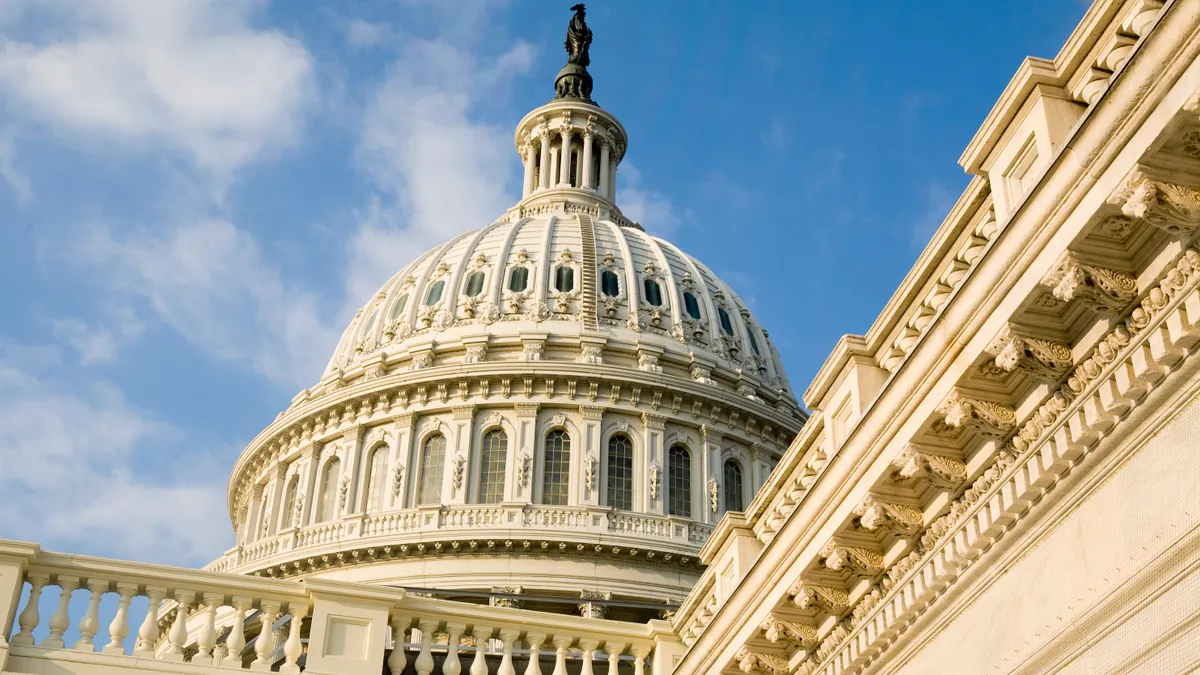The banking crisis that took down Silvergate, Signature and Silicon Valley Bank has potential as a slogan generator.
Lawmakers may be playing with the formula.
“We need competent financial supervisors,” House Financial Services Committee Chair Patrick McHenry, R-NC, said Wednesday in a hearing that featured testimony from Federal Reserve, Federal Deposit Insurance Corp. and Treasury officials. “But Congress can’t legislate competence.”
With that last part, McHenry seems to be riffing off of his own catchphrase formula.
When asked to comment last week on investor skittishness at regional banks, McHenry told Reuters, “Too often, as legislators, we walk around and assume the answer is legislation. We cannot legislate confidence.”
Legislators may not want to make a long-term strategy out of telling the American public what they can’t do.
Then again, if one were to look at President Joe Biden’s call for stricter liquidity rules and stress testing for banks with between $100 billion and $250 billion in assets, the message was aimed at regulators — bypassing the legislative branch altogether.
“Each of these items can be accomplished under existing law, and they build upon regulatory reforms already on this Administration’s agenda,” the White House wrote Thursday.
It hasn’t kept lawmakers from having opinions. Sen. Elizabeth Warren, for example, has used the crisis to introduce two bills — one to establish an independent Fed inspector general, and another to claw back windfalls given to executives of banks that failed.
"What I want to do is get banking back where it ought to be, and that is boring," Warren, D-MA, told CNBC on Friday.
That news outlet may be feeling the slogan-generation vibe, too — posting the story with the headline, “Sen. Elizabeth Warren says she wants to make banking boring again.”
Warren may bristle at the idea that she’d be pushing an agenda that follows the particularly Trumpian cadence, “Make ____ ____ again.”
The gist for consumers, Warren said, is that "banking is supposed to be there for putting your money in and you can count on it's going to be there.”
But she didn’t deny the drive for bankers to make “steady profits.”
"Banks should absolutely be able to make profits, but when banks load up on risks, they put depositors at risk, they put small businesses at risk, and ultimately as we've learned with these million-dollar banks, they put our whole economy at risk,” Warren said.
What are regulators doing?
As for regulators, the FDIC plans to propose a “special assessment” in May that would make larger banks culpable to come up with a greater share of the $22.5 billion hit the Deposit Insurance Fund will take, from the SVB and Signature failures, according to Bloomberg.
The breakdown and timing of the assessment are still in early stages of discussion, the wire service reported. The FDIC declined to comment to the wire service about the matter.
For reference, JPMorgan Chase took a $675 million hit in its second-quarter 2009 earnings when the FDIC sought to make up $5.5 billion through a special assessment, according to Bloomberg. The cost to the DIF from SVB and Signature’s failures appears four times larger.
The assessment talks come as lawmakers in both the Senate and the House expressed worry that, in the words of Sen. Patty Murray, D-WA, “well-managed community banks that didn’t take [the] risks” that SVB and Signature did would shoulder an outsize burden.
“I’m concerned that Arkansans will have to subsidize Silicon Valley Bank and Signature Banks deposits, and maybe others that come forward,” Sen. John Boozman, R-AR, told Treasury Secretary Janet Yellen at a hearing last week.
FDIC Chair Martin Gruenberg assured House lawmakers Wednesday the agency would be “keenly sensitive to the impact” to smaller banks.
“We have the discretion to tailor that assessment to the institutions that most directly benefited,” Gruenberg said.
Rep. Roger Williams, R-TX, followed up, “Take a look at it, because we all know that what they’ll do is pass the cost on to someone like me.”
A shift in tone
Notable, too, between this week’s Senate panel hearing Tuesday and House testimony the next day, was a shift in tone — particularly from Michael Barr, the Fed’s vice chair for supervision.
"Anytime you have a failure like this, bank management really failed, supervisors failed and our regulatory system failed," Barr told the House Financial Services Committee on Wednesday, according to American Banker.
That comment spreads blame far more than Barr’s remarks to the Senate Banking Committee on Tuesday.
“It is not the job of [Fed] supervisors to fix the issues identified,” he told the Senate panel. “It is the job of the bank’s senior management and board of directors to fix its problems.”
Barr said Fed supervisors in late 2021 found six matters requiring attention at SVB related to liquidity stress testing, contingency funding, and liquidity risk management. Central bank personnel issued three additional findings in 2022.
"That doesn't sound like a very urgent supervisory process," said Rep. French Hill, R-AR, according to American Banker.
Rep. Bill Foster, D-IL, according to Reuters, proposed adding a measure of transparency to the bank supervisory process — seeking to make “matters requiring attention” public if banks do not resolve them within 60 days.
Hill and other lawmakers Wednesday faulted the Fed for not classifying their findings under a more urgent or severe category.
"The fact that it was just MRAs and not public cease-and-desists suggests that the regulators thought it was a problem that could be fixed by bank management in a reasonable amount of time," Hill said.
"You are not running a consulting operation," said Rep. Brad Sherman, D-CA, according to Reuters. "You are running a regulatory operation who can force banks to follow that advice.”






















